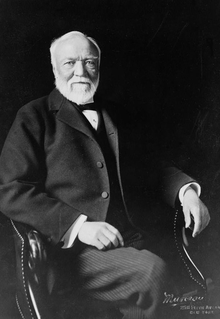
Surplus wealth is a sacred trust which its possessor is bound to administer in his lifetime for the good of the community.
Andrew Carnegie (25 November 1835 – 11 August 1919) was a Scottish-American businessman, a major philanthropist, and the founder of the Carnegie Steel Company, which later became U.S. Steel.
Quotes
- Three generations from shirtsleeves to shirtsleeves.
- Quoted in: George J. Borjas (2001) Heaven's Door: Immigration Policy and the American Economy. p. 132
Round the World, 1884
Carnegie, Andrew (1884). Round the World. New York: Charles Scribner's Sons. Retrieved on January 2, 2018.
- "Did you ever sum up these prizes and think how very little the millionaire has beyond the peasant, and how very often his additions tend not to happiness but to misery!"
- p. 353 General Conclusions.
Wealth, 1889
"Wealth," in: North American Review, June 1889 vol. 148, issue 391, p 653-664.
- The problem of our age is the proper administration of wealth, so that the ties of brotherhood may still bind together the rich and poor in harmonious relationship.
- p. 653
- While the law [of competition] may be sometimes hard for the individual, it is best for the race, because it insures the survival of the fittest in every department. We accept and welcome, therefore, as conditions to which we must accommodate ourselves, great inequality of environment, the concentration of business, industrial and commercial, in the hands of the few, and the law of competition between these, as being not only beneficial, but essential for the future progress of the race.
- p. 655
- Upon the sacredness of property civilization itself depends—the right of the laborer to his hundred dollars in the savings bank, and equally the legal right of the millionaire to his millions.
- p. 656
- Those who would administer wisely must, indeed, be wise, for one of the serious obstacles to the improvement of our race is indiscriminate charity.
- p. 662
- Thus is the problem of Rich and Poor to be solved. The laws of accumulation will be left free; the laws of distribution free. Individualism will continue, but the millionaire will be but a trustee of the poor; intrusted for a season with a great part of the increased wealth of the community, but administering it for the community far better than it could or would have done for itself. (pp. 663-664)
- The man who dies thus rich dies disgraced.
- p. 664
- Such, in my opinion, is the true Gospel concerning Wealth, obedience to which is destined some day to solve the problem of the Rich and the Poor, and to bring "Peace on earth, among men Good Will."
- p. 664
The Best Fields for Philanthropy, 1889
"The Best Fields for Philanthropy," in: North American Review, December 1889 vol. 149, issue 397
- Surplus wealth is a sacred trust which its possessor is bound to administer in his lifetime for the good of the community.
- p. 684
Autobiography of Andrew Carnegie, 1920
Carnegie, Andrew (1920). Autobiography of Andrew Carnegie with Illustrations. Retrieved on July 4, 2014.
- It is not the rich man's son that the young struggler for advancement has to fear in the race of life, nor his nephew, nor his cousin. Let him look out for the "dark horse" in the boy who begins by sweeping out the office.
- Chapter III
- Salary, (I said, quite offended) what do I care for salary? I do not want the salary; I want the position. It is glory enough to go back to the Pittsburgh Division in your former place. You can make my salary just what you please and you need not give me any more than what I am getting now... Oh, please don't speak to me of money!
- Chapter VII
- The sound rule in business is that you may give money freely when you have a surplus, but your name never—neither as endorser nor as member of a corporation with individual liability
- Chapter XVI
- No, Your Majesty, I do not like kings, but I do like a man behind a king when I find him.
- Chapter XXIX
External links
This article is issued from
Wikiquote.
The text is licensed under Creative
Commons - Attribution - Sharealike.
Additional terms may apply for the media files.